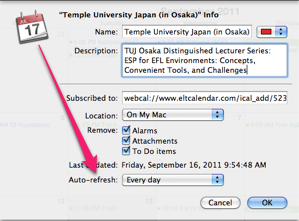Temple University, Japan Campus:
Age-related Factors in Second Language Learning (in Osaka)
Date: Saturday, September 29th, 2018 Time: 2:00 PM - 5:00 PM
Speaker: David Singleton (University of Pannonia, Hungary)
Description:
For most people the answer to the question of when it is best to begin learning a second language is self-evident. The cliche "the younger the better" would sum up the opinion delivered by the majority of respondents to such a question! We shall see in this course, however, that the facts of the matter are not so simple. The maturational perspective or Critical Period Hypothesis has had its original theoretical postulates swept away by more recent research. While it is true that in naturalistic contexts younger second language beginners tend in the long run to do better than older beginners, there are plenty of examples of people who start their second language experience in adolescence or adulthood and who end up native-like in the second language in question. It turns out that the key to success at any age relates to the quality of interaction and the affective dimensions of interaction with the second language and its users. With regard to the instructional context, the clear and consistent finding of more than forty years of research is that early schooling in a second language confers no lasting linguistic advantage over those whose second language exposure at school begins later. Recent findings suggest that in instructional settings too, quality of interaction, attitude and motivation are more important than starting age. These findings have unfortunately been ignored by governments and ministries of education around the world.
The course will explore all of these issues, and it will maintain a focus throughout on the educational implications of the research findings discussed. In particular, it will deliver the message that: whatever the age of the learners, it is very important to provide a lively and engaging experience of input and interaction in the target language, because; it is vital to maintain interest and motivation in regard to coming to grips with the target language, and; this seems to be more of a challenge with learners who begin L2 learning young and whose language-learning experience lasts longer.
Organization: Temple University, Japan Campus: the Graduate College of Education (Temple University, Japan Campus)
Cost: free
Venue: TUJ Osaka Campus in Umeda: Osaka Ekimae Bldg. 3, 21st Floor, 1-1-3-2100 Umeda, Kita-ku, Osaka 530-0001 (map)
Location: Osaka City, Osaka Prefecture, Japan
![]() Add this to iCal
Add this to iCal
![]() (Need help?)
(Need help?)
![]() Add to Outlook
Add to Outlook
![]() (Need help?)
(Need help?)
You can add this event to your iCal calendar.
- Click on the iCal icon. Your iCal software will start.
- Click 'Subscribe':

- Under 'Auto Refresh', select 'Every day' in case the the basic details change:

You can add this event to your Microsoft Outlook calendar.
- Click on the MS Outlook icon.
- See what happens.
- Tell us what happens. I don't have MS Outlook on a Windows computer, so I can't test it.
- If you click on the icon and nothing happens, do this:
- Right-click on the icon and save the file.
- According to Microsoft's support page, in Outlook's File menu, you should click Import and Export.
- Click to select Import an iCalendar or vCalendar file (*.vcs), and then click Next.
- Click to select the vCalendar file you've just saved, and then click Open.
Contact Temple University, Japan Campus
Website: www.tuj.ac.jp/grad-ed/seminars
Email QR Code:





